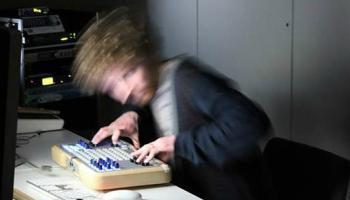Science Festival Interview with Dr Martin Parker
Dr Martin Parker, Director of Outreach at the Reid School of Music, joins Anne La Berge, Christos Michalakos and Ben Schogler to explore the ongoing influence of digital technology on music.
Please can you tell us what the audience can expect to experience at this event?

At this event you’ll hear some fantastic and original music performed by wonderful players and find out more about how digital technologies are not only helping to enable music-making across society, but also how these technologies are provoking change in music itself.
Why is it important to reflect on the impact of digital technology in music?
Digital technologies are embedded across society and as such, they influence all aspects of our lives. On the one hand the digital is a fantastic enabler of creativity and on the other, there is a mystery and a danger to society that these technologies imply. Better understanding of this duality will help us in general. Looking at this duality through music helps us to understand music better and how to harness digital elements to take music further.
What might surprise people about how technology has changed music?
I have two responses to this question. Firstly, this provides us with an opportunity to reflect on the fact that all musical instruments are technologies and to explore the idea that music itself is a technology of sorts.
The second response is that the changes to media and musical material that we’re currently experiencing are happening as a result of technological shifts – the instruments we use to make music are changing and therefore music is changing. The way this is changing is part of these technologies. For example, music doesn’t just have to be something that accompanies computer game action, music can be the game itself. We’ll see some of the work being done in this area at the event.
Why do you think it is important for researchers to engage with the Science Festival?
I think of the Edinburgh International Science Festival as a celebration of humanity’s impact on the planet. If celebrations of science offer us anything, it is the powerful reminder that progress for humanity is a balancing act between the nurturing of the human spirit and the infrastructure that permits humans to exist in the first place. Researchers are, by definition, faced with questions pertinent to the future of humanity. The science festival offers a richly trans-disciplinary forum for the discussion of these revelations.
What do you get out of interacting with audiences?
I am not a scientist by training and discipline, therefore I’m not bound to laboratory-like conditions in my work. In fact, audiences are an essential element in research into musical composition – we need audiences. There are elements of my specialism that are very important to involve audiences with, in particular exploring what feels like music and what we can start to call music. I’m looking forward to investigating this at the Sound Revolution event this week.
Event Details
The Sound Revolution is at 8pm on Wednesday 12th April at Summehall
Book tickets to The Sound Revolution on the Science Festival Website

